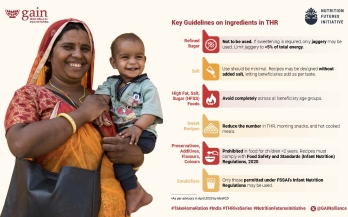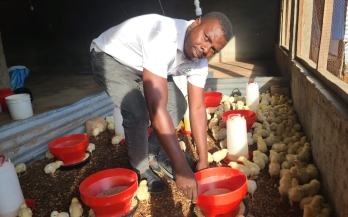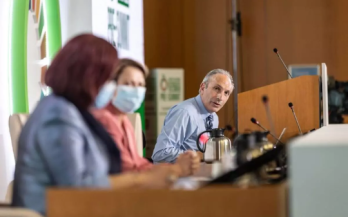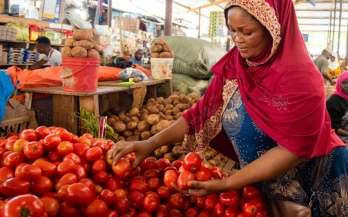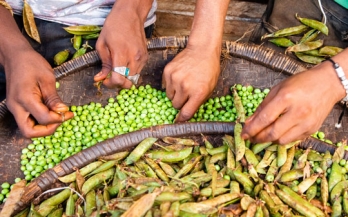Moma, Mozambique – When Islova Alberto Aly decided to venture into fish drying, her primary aim was to generate an income to support her children's education. Little did she know that her traditional fish drying methods—spreading fish on the ground by the Mucoroge beach, exposed to sand, dust, sun, and bacteria—would harm her community.
The Take-Home Ration (THR) component of India’s Supplementary Nutrition Programme, the world’s largest
flagship supplementary feeding programme under POSHAN 2.0 and Saksham Anganwadi, is a key intervention to improve the nutrition of children 6-36 months, adolescent girls, pregnant women, lactating mothers. THR has evolved over the years to ensure it provides adequate amount of daily and protein for children and PWLMs, with recent updates emphasizing macro- and micronutrient profiles and limiting added sugars, salt, preservatives, and synthetic additives.
Pemba, Mozambique – From the window of his house in Quissanga district, Cabo Delgado, Andrade Vitorino watched helplessly as his poultry farm collapsed due to strong winds and rains caused by cyclone Kenneth in 2019.
But since the 2017, it is the armed conflict in Cabo Delgado province that affected his business and various economic activities, as well as the functioning of food systems in the province.
“One day, a neighbour shouted that we were under attack, and we all ran away, leaving everything behind. A few days later I heard that everything had been burned down. Houses and everything, including my poultry,” said Andrade.
Seated on a plastic chair and turning his back to his house made of clay, in one of Pemba's neighbourhoods, where he is starting new life he says, “I didn't have time to take anything. Just my documents. My house, my aviary and my dreams were left behind.”
Ethiopia faces persistent malnutrition and emerging diet-related challenges. Nutrition for Growth (N4G), a pledging movement in which the world’s leaders have committed to centre nutrition, offers a platform to mobilize multisectoral action and accountability. GAIN offers technical expertise in food systems and nutrition governance, to support Ethiopia translate its national strategies in its goal of supporting the Government of Ethiopia (GoE) in accelerating its progress towards Food System Transformation.
Recently I was on panel chaired by the UN Deputy Secretary General, Amina Mohamed, where I was asked three questions about the UN’s “Stocktaking Moment” two years after the UN Food Systems Summit of 2021 (UNFSS). Here are my answers to the questions.
Dr Lawrence Haddad, Executive Director of the Global Alliance for Improved Nutrition (GAIN), has received his medal and been made a Companion of the Order of St Michael and St George for "services to International Nutrition, Food and Agriculture".
1 in 2 people reading this article are likely experiencing hidden hunger, in other words a lack of essential vitamins and minerals. That matters because these "micronutrients" are the micro drivers of functions such as our immune systems which keep us safe and healthy.
In the follow up to the UN Food Systems Summit, national policymakers are building their food system transformation pathways to articulate their priorities and goals and how they will be achieved. This is genuinely exciting, and in our opinion is the most important legacy of the Summit process. But while minds have to be changed, so do means. Priorities have to be reflected in budget spreadsheets as well as in speeches if food system transformation is to happen.
I remember well the first Nutrition for Growth Summit in 2013 in London. I wrote the framing paper for that Summit: why should we invest in improving nutrition status? Answer: because 45% of under 3 mortality is linked to malnutrition.
After a year of planning, the UN Food Systems Summit is just days away. A catalyst for an extraordinary outpouring of energy and creativity over these past 12 months - hundreds of thousands of people from governments, civil society, business, and development agencies have participated in the preparations.


